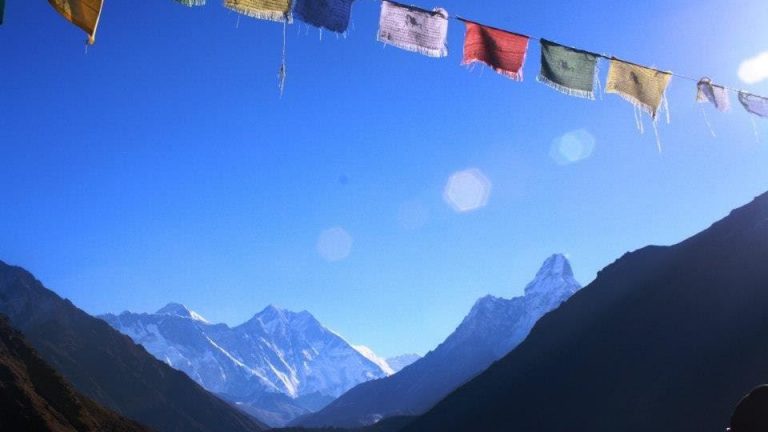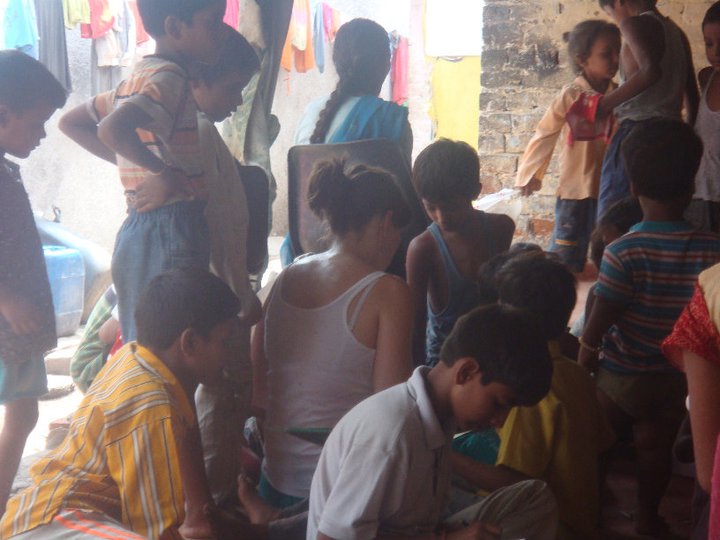
Orphanage Tourism in Nepal: What You Should Know
By: Heather Newgen
Orphanage Tourism in Nepa - Voluntourism is now a multi-billion industry and although the altruism of volunteers giving back while immersing themselves in a new culture is noble and heartwarming, it can also be dangerous. Unsuspecting do-gooders are unknowingly contributing to the harmful effects by shady organizations and tour operators who exploit the communities volunteers aim to help. This is especially true with children and orphanages.
According to Save the Children, 90% of the kids in orphanages aren't really orphans. They are trafficked or taken from their parents with the promise of a better life, but forced to live in extreme impoverished conditions so volunteers donate more money, making the scam increasingly profitable.

Heather Newgen “volunteering” with kids in India before realizing the organization was a scam
In addition, untrained people without skills or experience with vulnerable kids are encouraged to volunteer in orphanages, which is highly unethical and irresponsible. To make matters worse, most volunteers can interact with the kids unsupervised and background checks are rarely performed, which is a perfect situation for pedophiles.
Of course there are legit orphanages that serve as a trustworthy last resort for those who have no alternative option. However, a revolving door of short-term volunteers isn't helpful for anyone so below is the new UNICEF report that breaks down what's happening in Nepal with orphanage tourism and offers helpful information for volunteers.

Nepal Photo by: Chirag Sharma
Q. WHAT IS ORPHANAGE VOLUNTOURISM? 'Orphanage voluntourism’ includes activities that support orphanages by individuals who are primarily, or were initially, tourists on vacation. Usually the tourist wishes to include a social element in their vacation by volunteering their time. In some cases they also provide financial or material support to the orphanage.
Q. ARE THE CHILDREN IN ORPHANAGES ACTUALLY ORPHANS? Prior to the Nepal earthquake approximately 16,000 children resided at orphanages in Nepal. It has been estimated that up to 85% of children in orphanages in Nepal have at least one living parent.

Nepal Photo by: Chirag Sharma
Q. HOW CAN ORPHANAGE VOLUNTEERING BE HARMFUL? In some cases children are deliberately separated from their families and placed in orphanages so they can be used to attract fee-paying volunteers and donors. In some cases, children are also kept in poor conditions. Further, while orphanage volunteers are generally well-intentioned they often do not realize they could inadvertently cause harm to children. Volunteering for short periods of time without appropriate skills and training could contribute to a repeated sense of abandonment felt by already vulnerable children. In addition, background checks are often not conducted on volunteers. This can increase the risk to children of child sexual exploitation.
Q. WHY IS THERE GREATER RISK FOLLOWING THE 2015 EARTHQUAKE? The trend of sending children to orphanages in Kathmandu began following the civil war with promises of safety and education. There is concern that the earthquake will accelerate a similar trend and children will be separated from their families. UNICEF and NGOs are working with the Government of Nepal to stop the flow of children away from their families.

Nepal Photo by: Chirag Sharma
Q. WHAT ARE THE RISKS TO CHILDREN OF RESIDING IN ORPHANAGES? It has long been established that it is better for a child to grow up in a family environment and children should only be institutionalized as a last resort. When children grow up in orphanages they are at risk of physical, mental and sexual abuse. They may also experience attachment disorders later in life and find it hard to develop healthy emotional relationships with other adults. By volunteering at orphanages the institutionalization of children is inadvertently being supported.
Q. WHAT IS THE SOLUTION FOR CHILDREN THAT ARE GENUINE ORPHANS? As organizations like Next Generation Nepal and The Umbrella Foundation have shown, genuine orphans can be successfully reunified with extended family members such as uncles, aunts, grandparents, cousins or older brothers and sisters. Keeping children with a family is also preferential to growing up in an orphanage.

Nepal Photo by: Chirag Sharma
Q. HOW CAN YOU HELP CHILDREN IN NEPAL? UNICEF and its collaborators urges those wanting to volunteer with children, that are not qualified professionals, to reconsider. To help children in Nepal recover from the earthquake donate funds to reputable relief and development agencies, which re-build damaged rural communities and keep children and families together.
